But it can happen that a phrase intended to indicate a state beyond concepts just becomes another concept in itself, in the same way that if you ask a person their name and they reply that they have no name, you will then perhaps mistakenly call them ‘No name’.
Namkhai Norbu Rinpoche
Tibetan Wind Horse Prayer

As Wind carries our prayers
for Earth and All Life,
may respect and love light our way.
May our hearts be filled with compassion
for others and for ourselves.
May peace increase on Earth.
May it begin with me.
– Tibetan prayer flag is ‘Lung ta’,
meaning ‘Wind Horse’
Photo by Max Raphael
Brilliant Moon: Glimpses of Dilgo Khyentse Rinpoche | Full Documentary
BRILLIANT MOON: GLIMPSES OF DILGO KHYENTSE RINPOCHE chronicles the life of the writer, poet, and meditation master, one of Tibet’s most revered 20th-century Buddhist teachers. Known as the instructor of His Holiness the Dalai Lama and the Royal Family of Bhutan, his life and teachings were an inspiration to all who encountered him. Richard Gere and Lou Reed provide the narration for his dangerous journey out of China and the subsequent spread of his influence around the world.
BRILLIANT MOON was filmed in Tibet, India, Bhutan, the United States, and Nepal, and uses animation, rare archival footage, and interviews with some of Tibet’s great thinkers, to tell his moving life story, from birth to death to rebirth. Written and Directed by Neten Chokling (Milarepa), one of Khyentse Rinpoche’s students, it is an intimate, moving, and revelatory look at a transcendent spiritual being.
What causes war

“Wars arise partly from commercial reasons, but they also arise from the ill-will, the anger, the conflict, and the “us versus them” mentality. That’s what causes war. So, we cannot find the antidote when we ourselves are still in that state of mind. It’s obvious, isn’t it? If we want peace, we have to have peace within ourselves first, because our society is the reflection of the inner psyche and the minds of the beings inhabiting that society. Who is society if not us? We make our own environment, we destroy our own environment. And as long as our minds are full of the 3 poisons – the poison of ignorance, delusion, and confusion – of not seeing clearly at all; the poison of our greed, incessant longing, wanting and the “I-must-have” mentality; and the poison of ill-will, anger, conflict– then that’s what society is going to give us back. It just mirrors back the state of our own minds -the state of our own psyches.”
Jetsunma Tenzin Palmo

Relaxing music to unwind:
His Loneliness

The ultimate retreat

Ideally, the ultimate retreat is to retreat from the past and the future, to always remain in the present. However, our mind is so empowered and controlled by habit all the time. One characteristic of habit is not being able to sit still, not being able to remain in the present. This is because being in the present is so scary, so boring, and unbearable for our deluded and spoiled mind. Little do we know that actually being in the present is so exciting and the most liberating from all kinds of pain, suffering, and anxiety.
– Dzongsar Khyentse Rinpoche
Signs of Practice
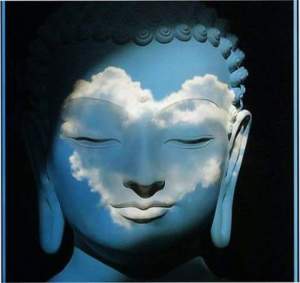
Life is like last night’s dream

Life is like last night’s dream. Don’t hold on to it as too solid or inherently existent. The following advice on practice is given with the intention of making your life—this most precious human life that you have received just this once—as meaningful as possible. In the past, you have sacrificed your life and died numberless times creating the cause of suffering in samsara but have almost never sacrificed your life for the sake of Dharma, especially trying to bring other sentient beings to enlightenment. So, do as much of what follows as you can, and don’t worry—be happy.
Lama Zopa Rinpoche
Continue:
Thoughts, as writing on water

The Tibetans sometimes describe thoughts as writing on water, in essence empty, unsubstantial, and transient
Jon Kabbat-Zinn
The trouble maker

The particular thing that has created the problems of life is the dissatisfied mind of desire, which clings first of all to this life, seeking only the temporary happiness of this life, and then to these eight objects: having comfort, not having discomfort, receiving materials (such as friends and so forth), not liking not to receive materials, having a good reputation, not having a reputation, receiving praise, not having criticism. The dissatisfied mind of desire clings to these eight objects.
– Lama Zopa Rinpoche
Our true enemy
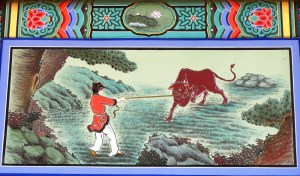
Hatred is compared to an enemy. This internal enemy, this inner enemy, has no other function than causing us harm. It is our true enemy, our ultimate enemy. It has no other function than simply destroying us, both in the immediate term and in the long term.
– 14th Dalai Lama
from the book “Healing Anger: The Power Of Patience From A Buddhist Perspective”
With thanks to Just Dharma Quotes
We are completely crazy

From morning to night we do everything with the self-cherishing mind. Inside the house, outside the house, getting dressed, walking around, talking to people, working, eating, seeing things, shopping, going to bed—we do everything with self-cherishing.
Even though everything we do is motivated by the wish to obtain temporal happiness and avoid temporal problems, in fact, everything we do creates the cause of greater, continual suffering in the future. For countless previous lifetimes, we’ve been carrying on like this, perpetuating the cycle of suffering, living fulltime with the thought of the eight worldly dharmas.
Unless we can break this cycle we will continue like this, doing the same thing on and on endlessly, because we’re using entirely the wrong methods to deal with our immediate worldly problems. We’re forever creating the causes for much greater suffering for ourselves. Really, we are crazy; completely crazy.
– Lama Zopa Rinpoche
source: http://www.lamayeshe.com/index.php…
Gems of Wisdom – Geluk TraditionLike Page
Intention
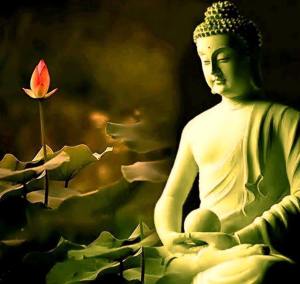
Even within Buddhism, there are various descriptions of this, but in the Mahayana tradition it [is] taught that the main criterion for an action being virtuous or non-virtuous is whether one’s intention is or is not virtuous. If you hold the motivation in your mind to be of benefit to others and that they may come to enjoy temporary and ultimate happiness and well-being, whatever actions of body, speech, and mind you may perform, they will all be on the side of virtue. But if you act with a negative mindset, out of a motivation that is afflicted by being jealous, malicious, competitive, and so on toward others, whatever you do will be non-virtuous. In brief, whether an action is considered as virtuous or non-virtuous depends mainly upon the underlying motivation or mindset either positive or negative. The results of good actions will also be good, while the outcomes of bad actions will be negative and painful.
– 17th Karmapa
from the book “Heart Advice of the Karmapa”
Fooled by appearance

If we recognize the unchanging, absolute nature of phenomena, we will also recognize their intangibility. Things appear yet are empty; they are empty yet appear. Emptiness is not the absence of phenomena, and phenomena are not the absence of emptiness. Rather, there is a union of appearance and emptiness. Just having a glimpse of understanding that things are not as they appear is already a big step toward seeing the true nature of things. We are like a naïve child who is easily fooled by appearances until we gain this understanding. In our confusion, we treat the phenomenal world as solid and real. We do not see that it is merely an expression of wisdom and the display of emptiness. We reify phenomena and this sets in motion an unending succession of attractions and aversions that lead to craving and desire. This one mistake, solidifying phenomena, gives rise to the endless cycle of samsara.
– Shechen Rabjam Rinpoche
from the book “The Great Medicine That Conquers Clinging to the Notion of Reality: Steps in Meditation on the Enlightened Mind”
With thanks to Just Dharma Quotes
Just another concept
Song of Samsara
When you are young and vigorous
You never think of old age coming,
But it approaches slow and sure
Like a seed growing underground.
When you are strong and healthy
You never think of sickness coming,
But it descends with sudden force
Like a stroke of lightning.
When involved in worldly things
You never think of death’s approach.
Quick it comes like thunder
Crashing round your head.
Sickness, old age and death
Ever meet each other
As do hands and mouth.
Waiting for his prey in ambush,
Yama is ready for his victim,
When disaster catches him.
Sparrows fly in single file. Like them,
Life, Death and Bardo follow one another.
Never apart from you
Are these three ‘visitors’.
Thus thinking, fear you not
Your sinful deeds?
Like strong arrows in ambush waiting,
Rebirth in Hell, as Hungry Ghost, or Beast
Is (the destiny) waiting to catch you.
If once into their traps you fall,
Hard will you find it to escape.
Do you not fear the miseries
You experienced in the past?
Surely you will feel much pain
If misfortunes attack you?
The woes of life succeed one another
Like the sea’s incessant waves
One has barely passed, before
The next one takes its place.
Until you are liberated, pain
and pleasure come and go at random
Like passers-by encountered in the street.
Pleasures are precarious,
Like bathing in the sun;
Transient, too, as snowstorms
Which come without warning.
Remembering these things,
Why not practise the Dharma?
from the book The Hundred Thousand Songs of Milarepa, Vol. 2
translated by Garma C. C. Chang
Kundan, a film about the Dalai Lama
Martin Scorcese did this film in 1997 about the life of the Dalai Lama
Tibetan Book of the Dead Quotes
It has been said that the Egyptian Book of the Dead and the Tibetan Book of the dead come from the same source of understanding.

Merely discovered
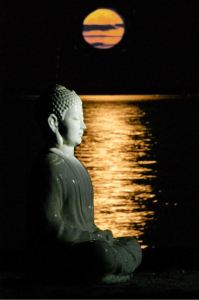
Anything that is created must sooner or later die. Enlightenment is permanent because we have not produced it; we have merely discovered it.
– Chögyam Trungpa
from the book “Cutting Through Spiritual Materialism”
With thanks to Just Dharma Quotes
Rather than being trapped by your perceptions
We are naturally attached to comfort and pleasure and bothered by physical and mental suffering. These innate tendencies lead us to seek out, maintain and try to increase whatever gives us pleasure comfortable clothing, delicious food, agreeable places, sensual pleasure – and to avoid or destroy whatever we find unpleasant or painful. Constantly changing and devoid of any true essence, these sensations rest on the ephemeral association of the mind with the body, and it is useless to be attached to them. Rather than being dragged along and trapped by your perceptions, just let them dissolve as soon as they form, like letters traced on the surface of water with your finger disappearing as you draw them.
– Dilgo Khyentse Rinpoche
from the book “The Hundred Verses of Advice: Tibetan Buddhist Teachings on What Matters Most”
With thanks to Just Dharma Quotes


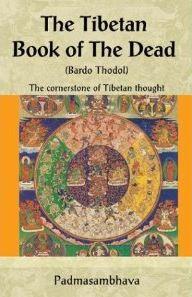







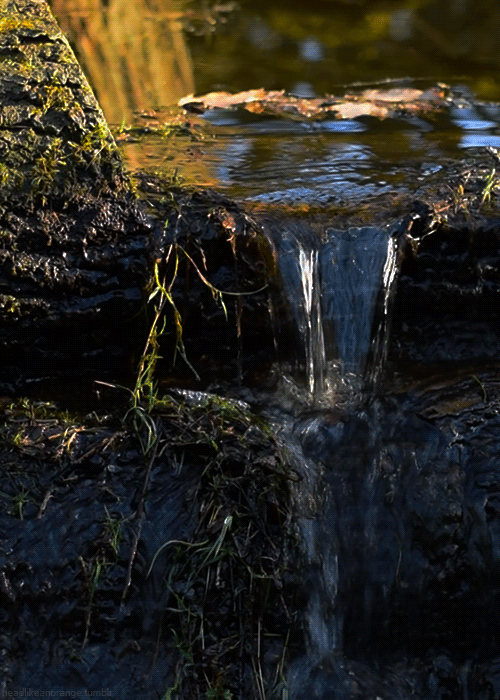
Recent Comments